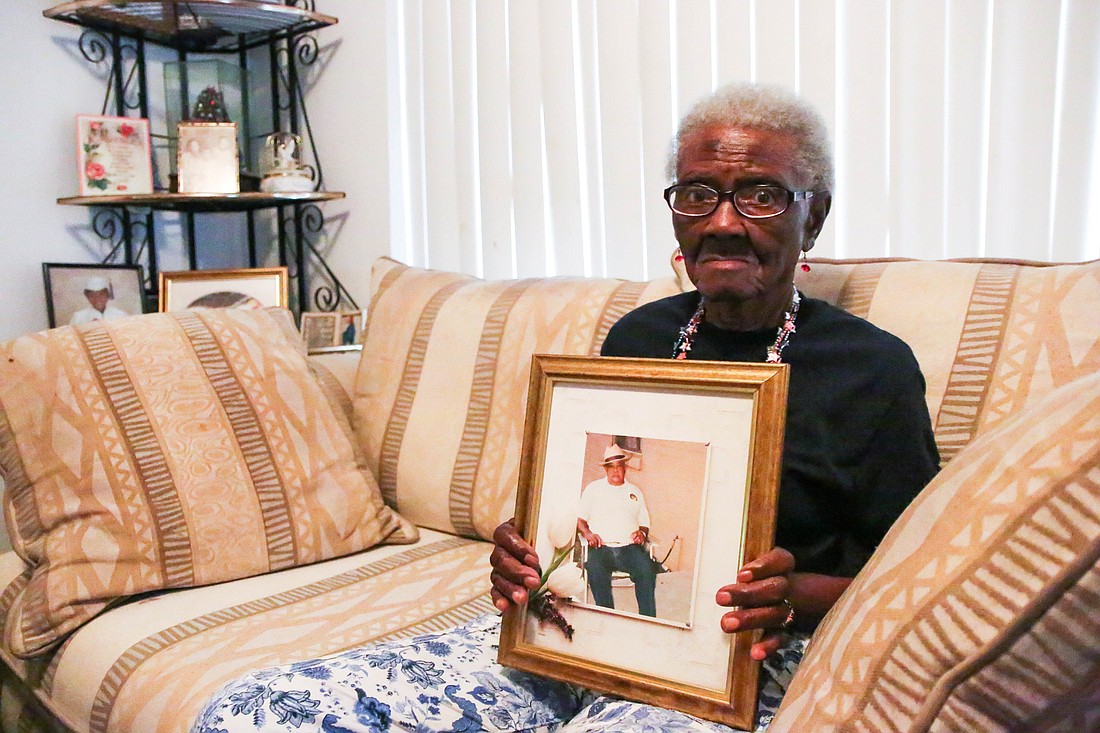- November 23, 2024
-
-
Loading

Loading

About 30 picture frames filled with generations of smiling faces lie under Luella Johnson’s mattress in her Palm Coast home, with many more scattered throughout the house. She likes to keep the memories close. Johnson moved to Flagler County amidst the start of integration in 1954, and has been here through it all.
She’s the mother of 16 adult children, including two who have died; her children have brought 81 grandchildren, more than 100 great-grandchildren, more than 200 great-great-grandchildren and two great-great-great-grandchildren into her life.
Johnson, who was born in Bonifay on June 8, 1922, moved to Georgia and then to Favoretta for her late-husband Harry Johnson Sr.’s work as a truck driver. She was a stay-at-home mom while Harry provided for their family. The couple was married for 63 years.
“You have what you have,” said Johnson about her many children. “I’m glad I did.”
Johnson spends her days visiting her daughters Gloria Shavers, 65, and Era Jackson, 78 — plus their many children and grandchildren — in Bunnell.
“I’m 95 years old right now. It feels good. I ain’t sick or nothing,” she said, adding that she likes living so close to them so she can remain in their lives.
This year, Johnson celebrated her life in Flagler County by riding a history-themed float in the Fourth of July parade in Flagler Beach. Two of her daughters, Ossie Cassell, 76, and Ida Jordan, 74, sat next to her, waving American flags and red, white and blue fans.
Shavers said she faced some opposition as a black woman in a newly integrated culture.
When integration in schools began in 1954 — the year Brown v. Board of Education passed — her white classmates would often push their desks to front of the classroom, all the way up to the blackboard, to remain as segregated as they could.
“They wanted to be first, not the second one, not third,” Shavers said. “So, we had trouble like that. We had to riot to the school.”
When she was in eighth or ninth grade, she remembers having to stand on the bus on the way to school in Favoretta.
“One morning I went, and there was one person sitting in the seat, so I sat there and they put their feet (up) so I wouldn’t sit,” Shavers said. “So, I got their feet and moved their feet, and I got in trouble for that from the school.”
Luella’s youngest son, Freddie Johnson, 49, said that while his siblings experienced some hardships with integration, his parents didn’t as much.
“Fortunately, my dad came down, and he got in contact with a great boss,” Freddie Johnson said. “He didn’t experience too many things because he was protected by his boss.”
Shavers said her experiences with white locals seemed to become more civilized and pleasant starting in 1969.
Now, Shavers enjoys living close to family, and she’s glad Luella comes to visit her children and grandchildren at her Bunnell home.
Freddie Johnson is a truck driver, just like his father. He has four children and one grandchild.
As the youngest of his siblings, Freddie Johnson grew up watching his mother take care of his brothers and sisters while his father supported them financially.
He described his mother as funny, outgoing and outspoken. He said she’s healthy for her age, too.
“She takes less medication than me,” he said, chuckling.